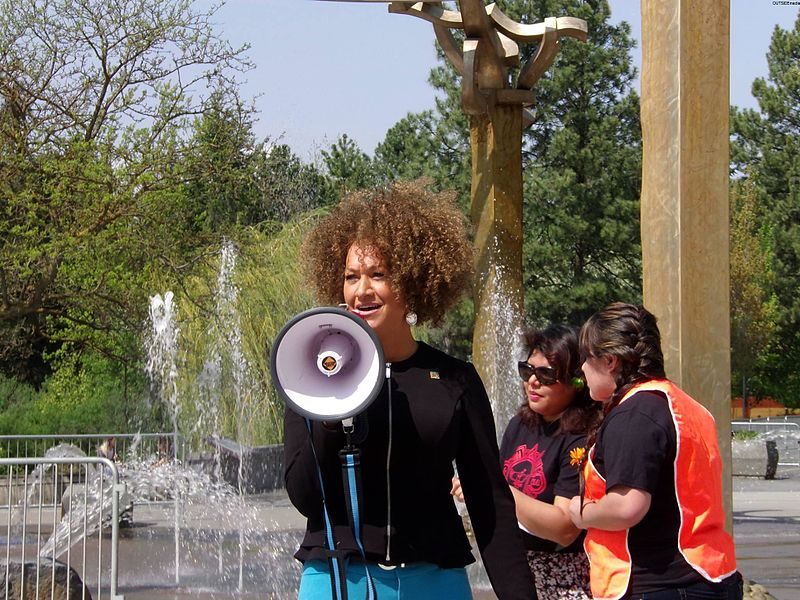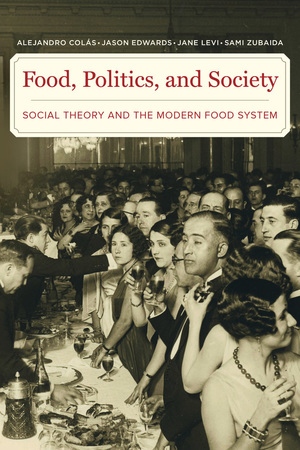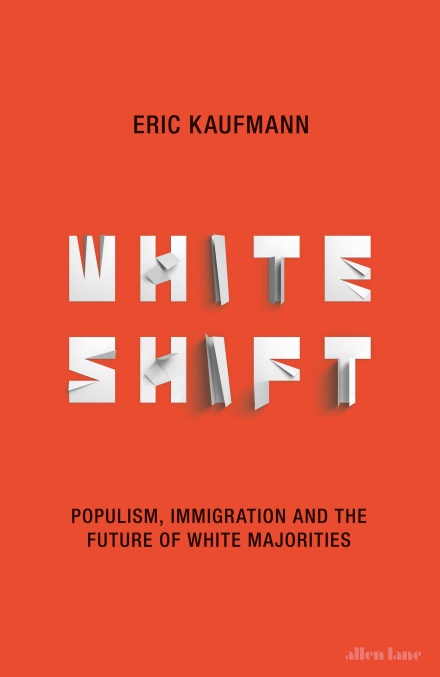Professor Joanna Bourke from Birkbeck’s Department of History, Classics and Archaeology explores the cultural and political significance of hair.
This is a summary of a free public lecture Joanna Bourke will be giving at Gresham College (30 Holborn EC1N) on 31 October 2019 between 18.00 and 19.00. It is part of a lecture series she will be presenting as the Gresham Professor of Rhetoric. Other topics include: Eye, Breast, Stomach, Clitoris/Penis, Foot.

Then NAACP President Rachel Dolezal speaking at a rally in downtown Spokane, Washington. Credit: Aaron Robert Kathman
In June 2015, Rachel Dolezal was exposed for having lied about being of African American heritage. Dolezal was head of her local branch of the National Association for the Advancement of Colored People (NAACP); she had given talks at the Eastern Washington University on African American politics, including a class on the role of hairstyles in the Black Power Movement; she was active in the African American community. The problem was: she was not African American. In making the transition, spray tans were never enough. Crucial to her “passing” as Black was the way she styled her hair in long dreadlocks, weaves, and box braids. Even one of her critics had to admit that she “definitely nailed the hair, I’ll give her that”.
In May 2019, Anna Sorokin (alias Anna Delvey) was imprisoned for scamming her way to the top of New York High Society by pretending to be a German heiress with a £60 million fortune. She may have worn Alexander Wang outfits but her “ratty” hair with split ends betrayed her. In the words of one commentator, “No real heiress would be seen dead without immaculately coiffured hair”.
These two cases illustrate the importance of hair to the staging of the self. Numerous historians, anthropologists, and sociologists have observed that the body is a site for the cultural production and staging of the self. Hair is one of the most visible of these social markers. Hair can be cut, coloured, curled, braided, knotted, crimped, twisted, straightened, backcombed, teased, moisturized, oiled, gelled, sprayed, shaved, and wrapped. People wear wigs, weaves, hairpieces, and extensions; they cover their hair with scarfs and hijabs, taqiyahs and yarmulkes.
Hair signals gender, class, status, age, generation, marital status, religion, group membership, familial ties, politics, social norms. It is personal, but it is also a highly visible cultural artifact. In Victorian society, it was taken for granted that a hair conveyed social and emotional messages. Indeed, it is difficult to find a Victorian novel that does not linger on the hair of its characters. Hair shows a character’s inner character. Thus, in Wuthering Heights, Isabella Linton had artfully arranged curls until, when upset, “her hair uncurled: some locks hanging lankly down, and some carelessly twisted round her head”. In contrast, Dracula had “hair growing scantily round the temples, but profusely elsewhere. His eyebrows were very massive, almost meeting over the nose”. Hair was also a major part of relic culture in Victorian culture, particularly between the 1850s and the 1880s. The Great Exhibition showcased at least 11 displays of hair art. A lock of hair encased in a locket or ring was a powerful relic, creating binding connections between lovers.
Aesthetic judgements about hair are fundamentally political. Slave-traders, prisoners of war, and female collaborators are routinely shaved as a form of dehumanisation. In 1905, Madam C. J. Walker became the wealthiest self-made female millionaire in America by marketing hair softeners to African American women; decades later, the “Black is Beautiful” movement repudiated such products. As Marcus Garvey (the Jamaican activist who, incidentally, came to Birkbeck in the year immediately before he co-established the Negro Universal Improvement Association) proudly proclaimed: “Don’t remove the kinks from your hair! Remove them from your brain!”. During the 1968 protests against the Miss American pageant, feminists not only threw bras and girdles into the Freedom Trash Can, but wigs, hair-curlers, and false eyelashes as well.
Today, schools routinely apply rules that stigmatise Black hair styles. It was only in July this year that California became the first US state to ban discrimination over natural hairstyles. Hair remains a system of power.




 Across the West, anti-immigration populists are tearing a path through the usual politics of left and right. Immigration is remaking Europe and North America; over half of American babies are non-white, and by the end of the century, minorities and those of mixed race are projected to form the majority in most Western European countries. The left-right distinction is being overshadowed by a culture war pitting whites who dislike diversity against those who embrace it. Ethnic transformation will continue, but conservative whites are unlikely to exit quietly; their feelings of alienation are already redrawing political lines and convulsing societies across the West.
Across the West, anti-immigration populists are tearing a path through the usual politics of left and right. Immigration is remaking Europe and North America; over half of American babies are non-white, and by the end of the century, minorities and those of mixed race are projected to form the majority in most Western European countries. The left-right distinction is being overshadowed by a culture war pitting whites who dislike diversity against those who embrace it. Ethnic transformation will continue, but conservative whites are unlikely to exit quietly; their feelings of alienation are already redrawing political lines and convulsing societies across the West.